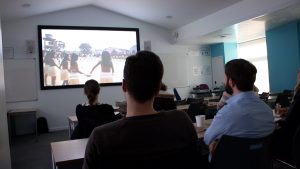After filmmaker Jorge Bodansky’s visit to Exeter and the screening of his landmark film Iracema, Dr Natália Pinazza, Lecturer in Portuguese in the department of Modern Languages & Cultures, writes about films set in the Amazon Rainforest.

On the 5th February, the Exeter Centre for Latin American Studies (EXCELAS) hosted an event with renowned Brazilian filmmaker Jorge Bodansky with a screening of his landmark film Iracema, Uma Transa Amazônica (Iracema, 1974) and presentation of his latest project Mercúrio. Bodansky talked to staff and students about his work on the Amazon Rainforest, which raised some issues that I will address in this post.
Iracema, Uma Transa Amazônica by Bodanzky and Orlando Senna is set during the construction of the Trans-Amazon Highway, which caused deforestation of the Amazon region and exposed indigenous populations to outsiders. Iracema inhabits an interstitial space between fictive construct and documentary. It overtly and consciously subverts the well-known iconography of the road movie genre, which consists of symbols of modernity such as highways and motor vehicles, when trying to problematise western notions of progress.
Iracema does not fail to ridicule the “civilised” positivist discourses behind the capitalist exploitation of nature. At the beginning of the film the truck driver, who introduces himself as Tião Brasil Grande (translated as “Sebastian Great Brazil”) dismisses indigenous approaches to the environment by claiming that “nature is the road” (a natureza é a estrada). This is clear when Tião relates the Trans-Amazon Project with development, by claiming “this place is improving, they are now building roads here”. For the indigenous female character, on the other hand, being on the road means prostituting herself. The film engages with a neocolonial critique where the highway prompts the circulation of commodities and investment of capital.
In Brazil a number of initiatives to promote indigenous expression through cinema have been taken by the Secretary of Identity and Diversity of the Brazilian Cultural Ministry. Amongst the projects that have significantly changed the situation in Brazil through indigenous media literacy, “vídeo na aldeia” stands out. The project consists of a group of filmmakers that provide indigenous communities with workshops so they can produce their own films. Initiatives like “vídeo na aldeia” often receive international support and encouragement, primarily due to the UNESCO 2005 convention on Diversity of Cultural Expressions. However, the representation of the original inhabitants of Brazil is often discussed in relation to the motif of encounter between European and indigenous people and their subsequent resistance to domination, which was installed by the colonisers and perpetuated by Brazilian society. This motif is explored in my second-year module “Travelling Identities in the Lusophone World”. https://humanities.exeter.ac.uk/modernlanguages/modules/MLP2005/description/

Iracema, a reference to José de Alencar’s classic Indianist romance Iracema (1865) is another film that evokes the relationship of a European, in this case a white lorry driver, and an indigene. This preoccupation with indigenous and environmental issues comes into play in other films including At Play in the Fields of the Lord (1989) and, more recently, Serras da Desordem. The film, however, updates the figure of both the coloniser and colonised to the 20th century so as to explore the perpetuation of colonial structures that keep the indigenous subservient. This approach is also adopted by Ajuricaba (1977). The traditional romance between European and indigene, which uses miscegenation as a metaphor for the foundation of Brazil, is subverted in Brava Gente Brasileira (2000). The film shows seduction by the indigene, who has some agency in the film, as a weapon to be used against the European coloniser.
An increasing number of Brazilian, and more generally Latin American, films have adopted the format of the road movie since Iracema. In previous publications, I have focused on how the leap to prominence of the Latin American road movie within film studies over the past five years has testified to the rethinking of the road movie as a global film category instead of a quintessentially US genre. Such a reframing foregrounds the diversity of Latin American road movies and their contribution to global film production, and refutes the notion that these films are mere attempts to copy Hollywood. Clearly, treating film production from different parts of the world as Hollywood’s “other” is not a problem exclusive to the road movie genre or Latin American cinema.
A recent example of a Latin American road movie set in the Amazon is Embrace of the Serpent (El Abrazo de la serpiente, 2015) by Colombian filmmaker Ciro Guerra. Embrace of the Serpent uses journeys to denounce historical colonialism and engage with more contemporary and global discourses on eco-criticism. Embrace of the Serpent’s narrative trajectory is shaped by the bewildering journey across the Amazon, undertaken by a shaman and two different scientists, each in search of a rare sacred plant, at different moments set 30 years apart. This defining feature of the genre was central to analysing Embrace of the Serpent’s postcolonial critique through its refusal of the road. In its refusal of the linearity of both the road and western storytelling, Embrace of the Serpent adheres to a strongly global agenda because the experience of violence and inequality as colonial legacies not only present an insurmountable obstacle for the region’s development but also a disaster for humanity.
Great post. I found what I was looking for. Do you mind if I post this on my website and give you credit? If not, it’s ok.
Good to become visiting your weblog once more, it has been months for me. Well this post that ive been waited for so long. I need this article to complete my assignment inside the university, and it has exact same topic with your post. Thanks, terrific share.
That is my third time visiting this internet site. We are beginning a new initiative in the same class as this website. Your site provided us with beneficial information to work on. You’ve gotten performed a admirable job. The rationale why i like this put up and it is so informational and I’m gonna save it. One thing to say the Indepth analysis this post has is vastly remarkable.Nobody goes that further mile these days? Well Executed!!!
Starting a site kind of like this one forced me to do some research and I found your post to be quite helpful. My site is centered around the idea of knowledge, fun and sharing. I wish you good luck with your website in the future and you can be sure I’ll be following it.
Thank you very much for posting this post. It has benifited me and my dad hundreds and I doubtless browing by way your other posts as I enjoyed this publish very much. Thanks once more and proceed the great work!
I am going to go ahead and bookmark this post for my sister for a study project for class. This is a good-looking website by the way. Where did you obtain the theme for this website?
Greate post. Keep posting such kind of info on your page.
Im really impressed by your blog.
Hi there, You have performed a fantastic job. I will certainly digg it and for my part suggest to my
friends. I am sure they will be benefited from
this site.
Heya i am for the first time here. I came across this
board and I find It really useful & it helped me out much.
I hope to give something back and help others
like you helped me.
We’re a group of volunteers and opening a new scheme in our
community. Your web site provided us with valuable information to work
on. You have done an impressive job and our entire community will be thankful
to you.
Hi my family member! I wish to say that this article is amazing, great written and come with approximately all important infos.
I would like to peer more posts like this .
I am really loving the theme/design of your site.
Do you ever run into any internet browser compatibility issues?
A few of my blog visitors have complained about my blog not operating correctly
in Explorer but looks great in Chrome. Do you have any tips to help fix this problem?
Prawdziwy z Ciebie talent i mistrz pióra z ogromną łatwością przekładasz myśli na słowa… trzymaj tak dalej, dbaj i pięlęgnuj swego bloga… Skąd czerpiesz tak ciekawe inspiracje ?